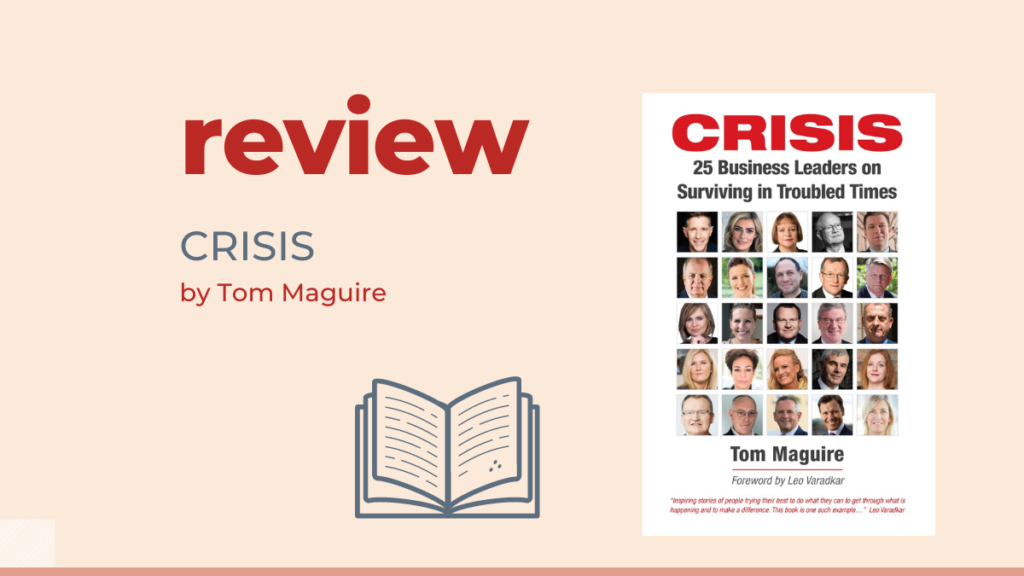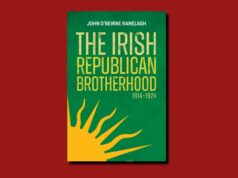
Crisis: 25 Business Leaders on Surviving in Troubled Times
By Tom Maguire | Orpen Press | pb €18.00 | 9781786051189
Review by Mary McCarthy
When things are going well and the orders are flowing in, it’s easy being a business leader. It’s when things go wrong that working life gets difficult and it is harder to cope when a crisis comes out of the blue like Covid-19 did. It was the disaster nobody expected and Tom Maguire, tax consultant at Deloitte, has written a useful and comforting book on how twenty five business people reacted when they had the rug pulled out from them.
There are wise tips to be gleaned on how to chart a steady course when things go belly-up and this makes it a useful book. It is comforting because many of the interviewees featured are from the industries worst affected – hospitality, the arts, tourism – and yet, somehow, a plan was made.
Covid-19 was ruthless in that it took everyone by surprise and for some it ruined their business overnight and this book will make readers feel better about their own sense of failure because many of the interviewees featured initially flailed in the wind and struggled. For many – such as food writer and owner of Ballyknocken House Catherine Fulvio and Mary McKenna CEO of Tour America – they were initially numb and frozen with the shock.
Many of the interviewees are well-known figures – Paul Reid CEO of the HSE, architect Dermot Bannon, Danny McCoy CEO of IBEC, Eímear Noone conductor and composer, Domini Kemp MD of the ITSA food group – and we get an interesting peek into how they remained unflappable when things were falling apart – with past crisis points in their working lives referenced.
Intertwined throughout are cultural references and quotes from movies and books that bring alive the insight along with off the cuff commentary from Maguire – for a tax professional he can be quite funny (sorry to my family members who are tax professionals). A constant presence is the story of the pilot Chesley “Sully” Sullenberger, who successfully landed the Airbus A320 carrying 155 people on January 17, 2009 at 3.24pm in the Hudson River shortly after taking off from New York’s LaGuardia Airport. What happened in those moments as the plane plummeted towards the river, barely clearing the George Washington Bridge, are a central plank of this book. How he snapped into action, went through the possibilities in his mind, and settled on a plan. The heroic landing of “Sully” is held up by McGuire as the gold standard of how to react in a crisis – how to keep the head when the worst possible happens.
Maguire has a column with the Sunday Business Post, and is well used to transforming technical taxation information into readable form, and his style works well here. There is a bit of business speak cliche, but not much; mostly it is an honest book – the first business book I have encountered to turn on the word ‘pivot’ for instance. Domini Kemp dislikes the word intently, and Tom agrees, because she points out it carries a lot of pressure, the idea that in a crisis you should be able to ‘turn on a dime’ because for many companies a ‘pivot’ is just not workable.
‘Crisis – 25 leaders on Surviving in Troubled Times’ is divided into sections and ends with tips for each critical decision point described. The first is how the interviewees coped in the initial WTF moment and an important lesson here is to look after yourself. Padriag O Ceidigh, former CEO of Aer Arann, speaks candidly of his stress-induced heart attack when his business was under pressure in the past and of the need to separate yourself so the anxiety does not consume you. Niall Gibbons, CEO at Tourism Ireland, describes how he watched the whole industry unravel in a way not contained in any risk register and he speaks openly of his disbelief. Economist Jim Power described how 25 public speaking engagements he was due to give over the following months were cancelled and how surreal it all felt. He compares the lead time of the financial crisis in 2008 when he had a warning. He had been tracking the subprime market in the US on a monthly basis and what the Federal Reserve was saying – so with the demise of Bear Stearns on St Patrick’s weekend his worst fears were realised. Covid, in comparison, was such a shock because there was no such warning. Everyone, can relate to his account. Eilis O’Leary, Deputy Head of Griffith college Dublin, details how she had to oversee an impressive instant migration to teaching on zoom. Domini Kemp speaks of how soul destroying it felt having to close her 13 food premises – a very complicated process.
The second stage is how to ‘aviate, navigate and communicate’. Basically how to keep the show on the road, in the first instance, then to look to see where you are going and to keep everyone who needs to be informed, really well informed. Among the many examples one stood out. Kevin Rafter, chair of the Arts council, describes how the organisation had to accelerate monies through approved grants organisations so they could pay performers and artists. Bursary schemes and commissions were given for work which may not be seen till 2022 and it was so important they moved quickly with so many suddenly out of work in this industry. What could have been a bureaucratic process was streamlined.
The next stage is to – Improvise, overcome and adapt. How did people change their business offering? Many of the interviewees, like Jim Power and social media expert Samantha Kelly, managed to establish their services online. The Revenue Commissioners has nearly 7,000 employees and Niall Cody, chairman of the Revenue Commissioners, discusses how the organisation quickly adapted to working from home to offer supportive taxation measures.
The last section is the – the ‘who you going call’ section – (from Ghostbusters!) how to grab a financial lifeboat. As an employer you have to communicate you have a workable plan to two different audiences: your employees and your customers and to let them know you can swim to shore.
In crisis comes opportunity is a big theme of the book and the last chapter looks at what positive changes we might see post pandemic. Many of the interviewees predicted flexible working – which has come to fruition with news this week a fifth of the public sector will now work from home. Maura Winston of Cairn Homes says new ways of working that were tried out to accommodate social distancing will be kept on – such as preventing different trades overlapping. Professor Niamh Brennan of UCD referenced a report from the University Maternity College Limerick that showed extremely low birth rates were markedly down in the pandemic due to less frenetic lifestyles.
Dr Rosalind Beere, entrepreneur and CEO of Chi Fit, thinks people are more aware of their wellbeing and Duncan Graham, CEO of retail excellence, believes companies successfully bulked up their online offerings and managed to facilitate their customers for example by offering a really good return policies online. Dermot Bannon felt Covid made him realise how much time he wasted travelling for work and Danny McCoy, CEO of IBEC, believes hybrid working will enhance people’s quality of life. Anton Savage Director the Communications Clinic had particularly strong tips – have a clear message, keep calm and be transparent. Employees will be uncertain and will look for direction and those initial communications to stakeholders are crucial and will be remembered.
Advice is offered that a good manager must take time to listen to staff concerns and answer their questions and you can’t sugarcoat the situation. Whatever you do, do not, as Niamh Brennan puts it ‘regress to silence’ unless you want your stakeholders to make up their own minds because nothing is as deafening as silence
Although ‘Crisis’ was written last summer, when the signs were that we were emerging from the worst of it (if only!), the lessons still stand and the technique of weaving Tom’s translation or interpretation, with many cultural references help draw out the wise nuggets of advice offered. It is only when a crisis strikes that leadership skills are tested and this book will prove an interesting read for those looking for tips on how to navigate the storm. Another positive reason to buy it is that all the income goes to Our Lady’s Hospice in Harold’s Cross.
***

Mary McCarthy: This Literary Life
Mary McCarthy is a freelance journalist writing for a number of publications. She is an avid reader and an iron-willed book club administrator.
@maryknowsbees











